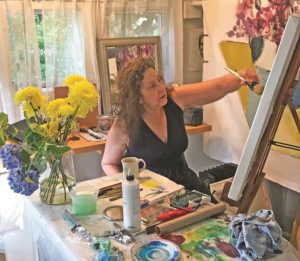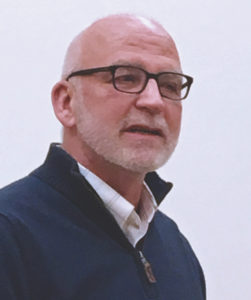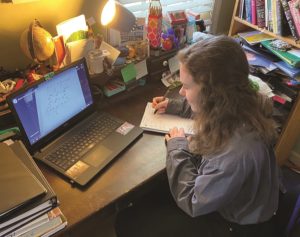The Wellfleet Public Library is hosting a Zoom talk with Helen Zia, author of Last Boat out of Shanghai and Asian American Dreams, on Thursday, June 24th, at 7 p.m. Zia, a journalist and activist, will speak about anti-Asian discrimination. Register for this free event by emailing [email protected].
zoom
Here and Queer
East End Books Ptown, 389 Commercial St., will host a Zoom and in-person event for Aaron S. Lecklider’s book Love’s Next Meeting: The Forgotten History of Homosexuality and the Left in American Culture on Tuesday, June 29th, at 6 p.m. Lecklider, a cultural critic and professor of American studies at UMass Boston, will talk about how queer culture and radical politics intersected between 1920 and 1960, years before Stonewall. Registration with $5 suggested donation is at eastendbooksptown.com.
Instant Classic
Open Mic Classical is an open mic series specifically for classical performers and singers. The next one, on Sunday, June 20th at 3 p.m. via Zoom, features pianist Craig Combs. Sign up at openmicclassical.org.
Shreefter Goes ‘Half & Half’ at Off Main
Robert Shreefter is having a virtual exhibition, “half-ourselves & half-not,” at Off Main Gallery in Wellfleet, with a Zoom opening reception on Saturday, December 12th, at 6 p.m. The exhibition will be available to view at offmaingallery.com through December 31st.
This series of silk screens is about mapping, says Shreefter in a gallery announcement: “The prints are not, of course, literal maps; they are maps that, while based on interior spaces I have inhabited, are more about emotional rather than physical space.
“The process and technique of making prints is somewhat out of the artist’s hand; the actual process of printing adds to the unpredictability of the finished piece,” says Shreefter. “I work in an intuitive and haphazard way — opting for the greatest amount of experimentation instead of imposing too much planning and organization. Each visual addition to the print — colors, marks, etc., adds to the possibility of surprise and ‘happy accidents.’ ”
Winter Courses at Open University of Wellfleet
The Open University of Wellfleet has announced its winter courses, taught via Zoom, now available for registration at openuniversityofwellfleet.org. They include “Remembering the Long Point Gallery” with Grace Hopkins, “Confronting Capitalism” with George Swope, and “The Dance Artistry of Busby Berkeley” with Marc Strauss.
The course on the Long Point Gallery will take place Wednesday mornings starting January 6th. The gallery, which became an important force in Provincetown, was founded in 1977 by 13 Cape Cod artists. Grace Hopkins, director of the Berta Walker Gallery, is the daughter of Long Point founder Budd Hopkins and the art critic and historian April Kingsley.
OP-ED
Connectivity Is a Necessity
The pandemic has made remote communication incalculably more important
The Independent has published articles about the problem of internet connectivity on the Outer Cape, and we are currently waiting to see the results of the latest round of negotiations with Comcast about its policies. I believe that a wired broadband connection should be considered a basic necessity and should be available to every home in our region.
A number of homes in Wellfleet, where I live, have no Comcast cable connection available. That is also true in Truro. They have been left out of company plans because of their remoteness; Comcast deems them not profitable.
I think most of the roads left out in Wellfleet are in or near the National Seashore. Comcast has gone around them, down other National Seashore roads with more dense and profitable development near the beaches. Connecting to OpenCape’s fiber optic alternative network is prohibitively expensive. Satellite and cell coverage are not equal in data strength, amount, or capacity for internet service compared to Comcast cable.
Where we are, near the Truro line, the cell phone signal is also poor. Why do we allow complete dead zones in our towns?
Comcast has reportedly offered to reduce its threshold for service from 25 to 15 houses per linear mile. In Wellfleet, at least, this will not fix the problem. I believe it would leave out an estimated 5 to 15 percent of all homes in Wellfleet. I have been unsuccessful in getting data or maps of Wellfleet’s coverage from Comcast or the town administration.
A serious commitment to close this gap in service is needed. Our town governments should demand accurate mapping of Comcast service coverage and, more important, lack of coverage. Putting ink on a contract with Comcast requiring service for every household would allow students and all residents to access what has become a basic utility.
This is an issue of educational, economic, and health equity. The coronavirus pandemic has made remote communication incalculably more important. After 10 years of fact-finding and advocacy, ever since the last contract negotiation with Comcast, I feel frustrated and forgotten.
It has been difficult for my family to keep up and on track. Common amenities like nonmetered wi-fi, streaming, updating, Zoom, Netflix, online courses, live calls, and gaming from home, which most people take for granted, are not available to us. The amount of time and money I have spent on workarounds is much too much. Being separated from aging and ill parents during the virus outbreak has made it even more difficult. Add the lack of ability to do common remote work and school functions from home, and you can imagine how I feel.
I hope this situation will be fixed within the next 10 years, or before the next public health crisis. It will never happen if we don’t make the effort.
Laura Shabott Finds Virtual Inspiration for Her Paintings
What would Hans Hofmann think of Zoom? That may sound like a silly question, but it’s one that is conjured up by Laura Shabott’s paintings at the Berta Walker Gallery in Provincetown, on view through Aug. 8 in a group show with work by Salvatore Del Deo, Romolo Del Deo, and the late Elspeth Halvorsen. Shabott, who was invited to join the gallery this year and who is heavily influenced by the late Hofmann’s teachings, created several pieces in the show during the last few months, using a model who is live online, via Zoom.

Shabott has taken a somewhat circuitous path to becoming a full-time painter. After graduating from the School of the Museum of Fine Arts in 1995, she spent 10 years working in the theater, then 10 more years as an arts writer. She committed to being a visual artist at the age of 57.
“My soul was a painter, and my truest need was to make paintings,” she says. “I have not had one moment of doubt.”
Shabott thinks of her past “not as time wasted, but as history as preparation for this moment.” Indeed, art cannot be created in a vacuum. As an older artist, she says, she can “let go of the investment,” taking risks and experimenting with different styles and media. But she’s always aware of the traditions and influences that precede her.
She describes Hofmann, and his famous push-and-pull technique, as key to her approach to art. She traces her lineage to the great abstract expressionist teacher through her own mentor, Wellfleet artist Robert Henry. Hofmann’s spirit is especially present in Ode to Hofmann #6, a painting in Berta Walker Gallery’s far room.

That piece is part of a series, painted between the winter of 2016 and spring of 2017, all of the same still-life tableau: a clay pitcher, a vase, an ink jar, and palettes. At the same time, it seems to evoke the human form: a foot, a vulva, a face.
Shabott’s analytical nature makes her an excellent teacher as well, especially for older students. In the courses she offers, she emphasizes principles rather than technique, so that students don’t copy a style and, instead, create their own personal language. She is currently teaching a class in push-pull still life at Truro Center for the Arts at Castle Hill, and one in figure drawing at the Provincetown Art Association and Museum. Both are “virtual open life,” held via Zoom.
Indeed, Shabott is not at all averse to new technology. “Since Covid, there has been a real sense of disruption, and I’ve allowed it,” says Shabott. The proof is in works such as Waiting, a four-by-five-foot canvas that graces the Walker Gallery’s front window, one of several pieces in the show to use a model on Zoom.

“This painting had many incarnations, with all of the work for the figure done on Zoom,” she says via email. “The model just had her baby, and this was finished a month before the birth.” The figure’s round belly and breasts are done with such authority, there is not an ounce of hesitation in the bold strokes.
“One benefit of virtual open life is being able to use paint, spread out, and make noise,” Shabott says. “The collage-making sounds of ripping, cutting, and gluing can happen without disturbing a room full of other artists.” Such is the case with He Was a King in a Past Life, which uses fabric, found materials, oil paper, and archival glue.
Though it’s not apparent that Waiting arose from a subject on Zoom, there is something eerie and beguiling about Window, another painting in the show. “Zoom open life reduces the figure to a screen the size of a laptop, so the model feels as if they are in an alternate reality,” Shabott says.
In Window, white oil pastel lines suggest dimensionality, but the perspective feels alien. The figure thrusts forward, as if part of a diorama, and the window is surrounded by a halo of light. A plug socket on the wall reminds the viewer of how the painting came about.

Aglow, another Zoom work, similarly focuses on light. The reds, whites, and teals in the figure cause it to come forward. The title of the piece gains new meaning when one realizes that the computer screen from which it was painted is a source of light.
In these works, Shabott combines Hofmann’s basic tenets — light, color, dimensionality, form — with the technology of the 21st century. But they mesh well: the computer screen is, after all, just another rectangle, another frame, like a window or doorway.
And the eye always perceives some degree of separation between itself and the object, whether it be the air, glass, or, in this case, an electronic screen. Shabott views painting from Zoom simply and directly: “Everything I paint is from life,” she says.
Model Behavior
The event: An exhibit of artwork by Laura Shabott, along with work by Salvatore Del Deo, Romolo Del Deo, and Elspeth Halvorsen
The time: Through Aug. 8; gallery open by appointment (calendly.com/bertawalker), Wednesday-Saturday, noon to 4 p.m.
The place: Berta Walker Gallery, 208 Bradford St., Provincetown
The cost: Free
CIVICS
Meeting Attendance Zooms Upward
Raise your hand if you’re for more participation
WELLFLEET — The number of people viewing and participating in virtual select board meetings here in recent weeks is breaking the board’s attendance records.
Since the Wellfleet Select Board began hosting meetings by videoconference on Zoom on March 24, they have attracted as many as 100 participants eager to watch policymakers deliberate on how the town will respond to the ever-changing pandemic landscape.
Virtual meetings have upped participation in all the Outer Cape towns, with the Provincetown Select Board getting 50 to 75 viewers on its Teams software, plus more who are not countable viewing the meetings on PTV, the local public access station, said Elizabeth Paine, the select board secretary.
Wellfleet is the only Outer Cape town to use Zoom as its primary access for viewers, thus making attendance easy to track. The numbers have been encouraging.
Administrative Assistant Courtney Butler, who has run the meetings in Wellfleet, said the new level of viewership has been surprising and not trouble-free. Butler had to turn people away from the May 12 meeting, when the select board voted to require beach stickers a month earlier than normal and make them available only for town residents and property owners.
Butler said Tuesday she was waiting for a $3,000 purchase order from town hall to upgrade Wellfleet’s Zoom license, so more than 100 people could participate.
She hoped to get it by the end of the month. Until then, she encourages people to stream the meetings on YouTube from the Wellfleet town media channel, and participate by sending emails to [email protected].
Remote access, coupled with the high-impact agenda items, has injected a shot of life into the select board meetings, said board member Kathleen Bacon.
“I think it’s a good thing,” Bacon said. “The more people that we can get involved in meetings, the better we can be.”
About 50 people is the most she can remember attending an in-person meeting.
“What occurs to me is that it’s a way of getting younger people, families, involved,” said Moe Barocas, who attends many town government meetings. He thinks videoconferencing should continue, even after the virus is tamed.
The unprecedented demand has board members and residents alike hoping that some town board members will have a change of heart about videotaping meetings.
Wellfleet is one of the only towns on the Cape where video recording of regulatory boards is optional, at the discretion of the individual boards. Wellfleet’s is the only planning board on the Cape whose meetings are not filmed, for example. The conservation commission and the board of health also aren’t videotaped.
“So many residents do not drive at night, so they do not go to these meetings,” Bacon said. “The only way they can see them is having them taped.”
Zoom does take some getting used to. The board asked participants not to interrupt, and to use the raised-hand button on Zoom rather than literally raising their hands.
“There has been a bit of a decorum issue,” Butler said. “People need to be recognized by the chair.”
CIVICS
Hoort Proposes Mail Ballot for Town Meeting
Can a New England tradition survive the pandemic?
WELLFLEET — Town Administrator Dan Hoort has asked the Outer Cape’s state legislators to try to get Beacon Hill to consider a radical remedy for the possibility that the traditional town meeting can’t survive the Covid-19 crisis: “I believe Massachusetts should allow a mail-in ballot to replace annual town meeting this year,” he wrote to Sen. Julian Cyr and Rep. Sarah Peake.

Hoort is clearly concerned that the crisis will have a devastating effect on town finances, with tax revenues and local residents’ incomes greatly reduced. He said he was looking at ways to make cuts now in the fiscal 2021 budget.
“Revenues relying on a busy summer season are going to be hit and hit hard,” he wrote. “If I can recommend adjustments now it may not be as bad for the FY 2022 budget.”
Hoort is worried that it will be a long time before residents feel comfortable crowding into the school gym for town meeting, which by law cannot conduct business with fewer than a quorum of citizens — currently about 175 voters.
“Everything I’m reading says we won’t even resemble being back to normal (or a new normal) until a vaccine is available, which is at least a year into the future,” he wrote. “Having just had our first Covid-19-related death in Wellfleet, I can’t imagine a scenario where our residents are willing to sit next to each other at town meeting for at least a year, if even then.” [See story on the death of Bruce Drucker, page 9.]
Cyr replied to Hoort’s message, saying that a chair of the legislature’s Joint Committee on Municipalities, Sen. Becca Rausch, was looking into the ideas of remote participation in town meeting and voting by mail. Peake’s response echoed Cyr’s, adding, “Let’s see where we are as we move forward. I think no one today can imagine what July will look like.”
The idea of remote participation in town meeting raises a host of questions with few answers. If participation depends on having access to a particular kind of computer technology and being comfortable with using it, does that seriously limit the ability of many citizens to exercise their rights? Is it feasible to conduct an open, orderly, and fair discussion and debate on town warrant questions with a large group of people using video or teleconference platforms?
Hoort noted that “through recent legislation the town has the option of reducing quorum requirements, but I find that to be a bad option, as it reduces participation. The mail-in ballot really is the best way to include everyone.”
He suggested that the ballot might include all the articles of a normal annual town meeting, or just those items considered high priority by the select board. “Each item would have the following voting options: (1) Approve; (2) Disapprove; (3) Indefinitely Postpone,” he wrote.
“Any ballot question that does not receive 50 percent or more in favor would be considered to have failed. This would allow those opposed to any item ample opportunity to vote against it.”
Mia Baumgarten, Wellfleet’s media operations manager, told the Independent on Tuesday that setting up town meeting for remote participation was possible, but it wouldn’t be easy.
“It would be very clunky on Zoom,” she said, referring to one of the most popular videoconference platforms. “You’d have to open it up to several avenues, and you’d still have issues of access. And what if there’s a storm? But it could be done, as long as the state says it’s OK.”
Baumgarten and other town officials said the part that concerned them most was the ability to have a real debate. That’s the essence of our town meeting form of government, they said.
The Independent has set up a videoconference “virtual open newsroom” to discuss the status of town meeting in the pandemic crisis. It will take place this Friday, April 17, from 4 to 5 p.m. For information on how to participate, call the newspaper at 508-237-8381.
LETTERS TO THE EDITOR
Letters, April 16, 2020
From Jay Gurewitsch, Montana Miller, Damon Katz, and Curtis Hartman
Retelling the Story
To the editor:
Celebrating Passover is indeed a challenge this year [“Year of the Plague,” April 9]. But such challenges are in fact central to the story of Passover itself.
It is a mistake to believe that reinventing the haggadah is a modern idea. My mother has for decades used one with different color inks to mark which words, and, in some cases, which letters in a word, were added over hundreds of generations. Its dozens of layers span generations of rabbinic interpretation like links in a chain, right up to the 20th-century additions of Miriam’s cup and questions for LGBT people.
Surely, as we sit trapped at home, we can appreciate freedom in a way that we never could before. As my 14-day quarantine after a visit to my family in New York City ended on the first night of Passover, the transition from slavery to freedom was clear to me.
As for the wine spilled from our cups during the recitation of the ten plagues, the rabbis teach us that, even as we celebrate our freedom, we must lessen our joy by reducing the cup of wine, because real people suffered real harm. Acknowledging the suffering all around us in the midst of the joy of the seder is profoundly important now, lest we become complacent in the safety of our own homes.
My family gathered around our laptops and dinner tables and spent four hours singing, laughing, and enjoying the retelling of the Passover story via Facebook Portal. I found it enormously moving, given the circumstances. That is precisely the point of the seder: reconnecting not just with family but with a tradition that offers connection both with the past and with our present, finding new layers of meaning in ancient and modern text alike.
May we all celebrate and enjoy our holidays together again soon, regardless of tradition or text.
Jay Gurewitsch
Provincetown
Passover Seder 2020
To the editor:
On the improvisational nature of the Passover seder — I felt this to be especially true as we stumbled our way through our “virtual seder” with varying degrees of comfort with the Zoom technology.
The sense of loss and of connection was strong as I watched my sisters, their husbands, their children, and my parents going through the ritual of symbolic foods and essential questions. When my nephew asked why we recline on this night and not on other nights, I silently answered that, personally, I was reclining because of the symptoms of the virus causing me physical misery.
But finding humor even in the midst of misery is a distinctly Jewish trait, so when the seder was over, I sent my father a meme I knew he would appreciate: “Commemorating not getting killed by a plague during a plague that you hope you’re not getting killed by is probably as Jewish as you can get.”
He returned the favor by reminding me of my favorite Passover joke, about the blind man who picks up a piece of matzo and exclaims, “Who wrote this shit?”
Montana Miller
Bowling Green, Ohio
The Time for Scrutiny
To the editor:
I subscribed to the Independent today because I just heard Truro Select Board Chair Jan Worthington attack something you wrote as “irresponsible” and say, “now is not the time” for such critical news stories.
It is the second thing I’ve heard from Ms. Worthington in the past month that offended me — the first being her automated phone call to my home in Truro telling me I shouldn’t be here.
Now is exactly the time for news people to scrutinize the actions of government. Please keep at it, and thank you.
Damon Katz
Boston and Truro
Kudos
To the editor:
I am proud to be a new subscriber to the Independent. Particular thanks for your editorial about the Truro Select Board’s statement on “outsiders.”
Courageous, well thought out, and well written.
Curtis Hartman
Truro
HOME SCHOOLING
Distance Learning Doesn’t Inspire
At all levels, students and teachers search for motivation
School’s out for at least a month and half. That news would normally be heralded by kids as manna from heaven. But distance learning is presenting plenty of frustrations for children and teachers. And the truth is, they miss each other terribly.
If there is a silver lining to the March 15 to May 4 school closings — what’s been called for by the governor so far — Nauset Regional High School Principal Christopher Ellsasser may have found it. This is, he said, “a prioritizing opportunity,” a time to ask what makes kids want to learn.
Students, parents, and teachers are finding rules need to be bent. Educators have cut back on expectations of hours spent staring at a screen. And grades will be just “credit or no credit” for the second and third terms of school, Ellsasser said. This year, he added, “we think everyone will have an asterisk on their transcripts.”
MCAS exams will “go away,” for this spring, too, said Supt. Michael Gradone of Truro Central School. The federal government has granted a waiver to allow this, and the state legislature is expected to follow suit, he said. Gradone believes the upside is the chance to find ways to keep students engaged in learning for the sake of learning itself.
School leaders agree the challenge of mastering online teaching platforms leaves much room for error. “We are building the airplane while we’re in the air,” said Paul Niles, executive director of the Cape Cod Lighthouse Charter School, which educates 243 sixth- through eighth-graders, about one fifth of them from the Nauset district.
For the Youngest, ‘Not a Good Way to Teach’
At the Provincetown Schools, even the youngest students are asked to sit before a screen for three hours a day on Zoom or Google Meet.
“I’m saying the rules around screen time are off; this is a pandemic — let’s get through it,” said Suzanne Scallion, the Provincetown superintendent.
That’s not all instructional time, she explained. She said her elementary teachers are moderating virtual lunch and recess, so the children can be together remotely, as well as checking in on students.

This approach differs from those in the other Outer Cape elementary schools. They are not holding long Zoom sessions, but mixing short teacher check-ins with a suggested list of resources students and parents can tap into.
The youngest students are least likely to be able to handle virtual school without heavy parental involvement.
“The teachers are doing an amazing job to provide resources, but little kids aren’t independent,” said Ariana Bradford, a part-time Wellfleet Elementary School computer teacher. “So it’s time-consuming for parents. The message from the school administration is ‘We understand this is a hard time, so your mental and physical health is the most important thing,’ ” Bradford said.
Even so, “The kids generally do not like virtual school,” said Lisa Daunais, the Provincetown Schools kindergarten teacher. “They miss each other and me.”
And learning gaps get wider when some kids lack internet access, devices, or supervision. For that reason, Truro’s Gradone says teachers there are not aiming to present new material.
“To be candid, this is not a good way to teach,” Gradone said.
Middle School Tightrope
At the Cape Cod Lighthouse Charter School, educators are walking a “tightrope” as far as holding students accountable without grading them, Paul Niles said.
The guidance from the state Dept. of Elementary and Secondary Education is to have “accountability light,” he said.
“We are not grading in the traditional sense,” said Julie Kobold, Nauset Regional Middle School principal. Instead, she said, “Teachers are giving feedback on submitted work.”
In many cases, teachers are giving far more than that. Reva Blau, who teaches English as a second language (called ELL) at Nauset Middle School, said many immigrant families are headed by one or two parents who are essential workers — nurses, other health-care workers, or grocery clerks.
“As ELL teachers, our relationship is more important than ever,” Blau wrote via email.
She checks in on wi-fi connectedness, supplies books, and doles out emotional support — she has videotaped puppet shows and serenaded kids outside their windows.
“A responsive teacher attuned to students’ needs is what helps the most,” Blau said.
Empathy Motivates

Sophomore Nell Hamilton, the 2022 class president at NRHS, is an honor student. But finding the inspiration to get her work done has been a struggle since March 15, she said by phone from her home in Eastham.
She is reading Elie Wiesel’s Night in English and learning Algebra II.
“Math is not my strongest subject, and we have not done any Zoom for that class,” she said.
Empathy motivates her, Hamilton said, to pursue it anyway. Teachers are working hard to make assignments, so she feels obligated to do the work.
Also, she realizes next year is looming, and she will need to understand grade 11 material.
Ellsasser, Nauset High’s principal, said his staff realized quickly that trying to replicate classroom learning via computer doesn’t work. Evaluation has to shift at a time like this.
He has told teachers, “Don’t think about how much work kids could do,” he said. “Think how much work you can provide useful and timely feedback on.”
Staff reporter Ryan Fitzgerald contributed to this article.
currents
This Week in Wellfleet
Meetings Ahead
Meetings are held by videoconference. On the town’s website, wellfleet-ma.gov, look on the right side under the calendar and click on All Upcoming Events for a calendar of meetings. Click on the name of the meeting you want to join.
Thursday, April 9
- Nauset Regional School Committee, 6 p.m.
Tuesday, April 14
- Select Board with Emergency Management Team, Covid-19 updates, 10 a.m.
- Board of Water Commissioners, 4 p.m.
Wednesday, April 15
- Water Commissioners, 4 p.m.
Thursday, April 16
- Barnstable County HOME Consortium, 8:30 a.m.
- Cape Cod Commission, Herring River Executive Committee, 3 p.m.
- Zoning Board of Appeals, 7 p.m.
Conversation Starters
Coronavirus Update
Wellfleet has had four confirmed cases of coronavirus as of April 7, according to the health department.
Don’t Hesitate to Call 911
Some people have not been calling the Wellfleet Fire Dept. when they need help because they didn’t want to go to the hospital or waste first responders’ time. “Please don’t do that,” said Fire Chief Richard Pauley on April 7. “Your health is still important.”
No Tennis, No Playground, but Beaches Open
The town holds weekly Covid-19 update Zoom meetings on Tuesdays at 10 a.m. Anyone may listen and participate in these by following the link on the town’s website.
On April 7, Becky Rosenberg, the recreation director, announced that the Baker’s Field recreation area, including the playground, the skateboard park, and the tennis and pickleball courts, are closed until at least May 1. The U.S. Tennis Association recommended a “collective pause” due to the common touching of tennis equipment, Rosenberg said. Beaches are still open.
Mask Making
Hillary Greenberg-Lemos, the town health agent, recommends people do wear masks outdoors. They can be homemade, but they must be tightfitting and cover the nose and mouth, she said. They should have two fabric layers and should be washable with soap and hot water. Town officials are compiling a list of sources where Wellfleet residents can get masks. First responders have recently received shipments of personal protective equipment, said Fire Chief Pauley on April 7. The police and fire departments have enough for the next 30 to 40 days, he said. —K.C. Myers.
currents
This Week in Wellfleet
Meetings Ahead
Wellfleet meetings are held with video conferencing technology. Go to the agenda of each meeting on the town website for the links.
Thursday, April 2
- Lawrence Road Task Force, 10 a.m.
Tuesday, April 7
- Finance Committee, 7 p.m.
Wednesday, April 8
- Historical Commission, 6:15 p.m.
Conversation Starters
Volunteers Help Deliver Food
The Wellfleet Council on Aging reports this week on a number of ways people are helping deliver food so as to protect elders from exposure to coronavirus.
Thanks to volunteer efforts of the Nauset Regional High School Honor Society, groceries from the Orleans Whole Food Store, ordered by phone, can be delivered to Wellfleet and Eastham homes. Call 508-255-6540 before noon on the same day you wish to receive the groceries. Deliveries take place between 2 and 4 p.m.
The Wellfleet Council on Aging can pick up groceries at the Wellfleet Marketplace for delivery to seniors’ homes on Thursday mornings. Orders can be placed by calling 508-349-3156.
The Wellfleet food pantry at Grace Chapel on Lieutenant Island Road held a curbside food pickup March 24. It provided food to nearly 70 families. The next drive-up distribution in Wellfleet is scheduled for Tuesday, April 7, according to the Council on Aging.
Recycling, Pay-as-You-Throw Suspended
Recycling at the Wellfleet Transfer Station is on hold due to coronavirus concerns. For staff safety purposes, the transfer station won’t accept construction debris, recycling, demolition, or yard waste. You can throw out your trash for free — no pay-as-you-throw purple bags needed from now to April 30. The town staff asks that you hold all items except trash until the staffing restrictions are lifted. —K.C. Myers
currents
This Week in Wellfleet
Meetings Ahead
Wellfleet is holding virtual regulatory town board public hearings through Zoom conference calls. To access the meetings and participate, follow the instructions below.
Go to the Wellfleet website homepage. On the right side of the screen, you will see a calendar. Hover your mouse over a day to see what meetings the town is holding that day. Click on the meeting in which you would like to participate. From there, scroll down to where it says “Join Zoom Meeting.” Make a note of the “Meeting ID” listed as you will need this later. Click on the link below “Join Zoom Meeting”; this will bring you to the Zoom website. Click on “click here” and then click “join from your browser.” Type in the “Meeting ID” number from before if prompted. Once the meeting has started, you will be able to speak, as well as see and hear everybody else on the call.
Tuesday, March 31
- Herring River Stakeholders Group, 5:30 p.m.
- Water Commissioners, 6 p.m.
Thursday, April 2
- Cape Cod Commission Herring River Hearing, 3 p.m.
Conversation Starters
Town Meeting June 1
The Wellfleet Annual Town Meeting will not be held on April 27 as originally planned due to the restrictions on public meetings resulting from the coronavirus pandemic. The select board set a new date of June 1, though that could change.
Since the warrant had not been signed yet, the select board had the authority to leave open the date, according to Gov. Charlie Baker’s COVID-19 emergency actions.
On March 24, the select board agreed the meeting could be delayed again to June 15 if Baker’s orders banning public gatherings over 10 people and a stay-at-home advisory continues. But for now, the board has settled on June 1.
Town Administrator Screening
The select board picked four of the five members of the committee that will help select the new town administrator. Town Administrator Dan Hoort is resigning June 30, though he has said he’ll continue working part-time if no one has been hired by July 1.
The new members of the screening committee are Harry Terkanian, David Mead-Fox, Liz Smith, and Jim Hood. There is still a fifth seat to fill. David Agger had told Kathleen Bacon, a select board member, he wanted to serve on the board, Bacon said. But since he had not made it onto the agenda, all applications are still being accepted, said Janet Reinhart, the select board chair. —K.C. Myers
currents
This Week in Wellfleet
Meetings Ahead
The coronavirus has taken a toll on civic involvement, but you can still watch and call in to the meetings that have not been canceled. Town offices and buildings are closed, but Wellfleet is using Zoom Rooms, a software-based conference room application that can include over 100 participants, said Courtney Butler, executive assistant to Town Administrator Dan Hoort. Many meetings have been delayed or canceled, so it’s best to frequently check the town website, www.wellfleet-ma.gov, which will include links to conference into meetings.
Wellfleet is unique on the Outer Cape in that regulatory boards, including the conservation commission and planning board, are not normally recorded. But in order to comply with the open meeting law when in-person meetings are not allowed, they must now be recorded, Butler said.
There is a chat feature to participate in meetings, or you can email questions to Butler at [email protected].
Tuesday, March 24
- Nauset Regional School Negotiations Subcommittee, 5 p.m.
Wednesday, March 25
- Nauset Regional School Committee Building Committee Forum, 6 p.m.
Conversation Starters
Curley and Smith Take Out Papers
There is an upcoming town election on May 4, and the following people have taken out nomination papers to run for elected office in Wellfleet. The deadline for taking out papers was March 6 and papers must be returned by March 30.
Two candidates have taken out papers for Kathleen Bacon’s seat on the select board. Bacon will not run for office again. They are Ryan Curley and Susan E. Smith.
Incumbent Christopher Easley is the only one running for one seat on the Nauset Regional School Committee. Incumbent moderator Dan Silverman has pulled and returned his papers. Gary Sorkin is running unopposed for the housing authority. On the board of library trustees both Robin Robinson and Andrew Freeman are running unopposed for two seats. Martha Gordon is running unopposed for the elementary school committee; there is another seat that’s still open. Nancy Vail has pulled papers for the cemetery commission. —K.C. Myers
